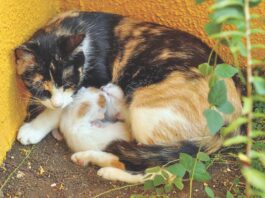Going Away? Plan for Your Pets Care
You have a wonderful vacation planned, a two-week escapade to a sunny island after a long year of hard work and stress. You’ve been looking forward to it for months, but a nagging problem remains: Who should take care of Tiger while you’re away? How to Decide. What you do with your cat when you take a vacation should depend on your cat’s personality, health condition, age and the resources available where you live. Hiring a pet sitter, kenneling your cat or boarding him with a veterinarian are all reasonable options for care when you aren’t home.
Ask Elizabeth: January 2012
We adopted a new kitten from a local rescue group last month, and she is just perfect. Although she had been tested for the feline leukemia virus and FIV by the terrific group that saved her from the street, we took her to our veterinarian right away so that she could be examined before we introduced her to our two older cats. After a clean bill of health, we brought Bunny home, and she has become a well-integrated part of the family. The problem is that before we scheduled her spay surgery, she came into heat. What a scene!
Fire Safety Tips to Heed
It’s human nature to postpone preparing for a disaster, but it’s vitally important that you take time now to put a plan in place before a fire occurs. Start by installing smoke detectors throughout your home and make sure the batteries are functioning properly. Change the batteries twice a year or more frequently if the smoke detector “beeps” to warn you that battery power is low. Many people put in new batteries when they change their clocks for daylight savings time.
Ask Elizabeth: December 2011
Dear Elizabeth: I have a five-year-old indoor cat, Baby, with whom I’ve shared my home ever since she was born. I’ve never had any other companion animals, so it’s been just Baby and me for all that time. Here’s my problem: I recently became engaged and at some point in the near future will be moving into my fiance’s home. He has two cats — both females. One is just about Baby’s age and the other is probably about seven years old. Neither one of them is very friendly. Naturally, I’m concerned about moving Baby into this new environment. I’m afraid that the animals will fight and hurt each other. I’ll appreciate any advice on how I can best address this dilemma.
How to Protect Your Furniture
Several years ago, Susan Westerly took her cat, Delia, and moved in with her elderly grandmother — relieving some financial stress for Susan and allowing her grandmother to remain somewhat independent as her health declined. The old house was filled with beautiful antique furniture, and because Susan didn’t think she had any other options, she had Delia declawed. The cat eventually adjusted to life without her claws, but Susan felt very guilty.
Enjoying Hazard-Free Holidays
The holiday season is fast approaching, and your cat’s safety is probably the last thing on your mind — well behind preparing Thanksgiving dinner for your new in-laws and buying presents for Christmas or Chanukah. But it shouldn’t be. Probably the most important “gift” you can give your feline friend during these holidays is the pledge to remain alert about her whereabouts and well-being when your home is filled with guests, enticing foods, gift-wrapped goodies and new plants.
Ask Elizabeth: November 2011
Dear Elizabeth: Our seven-year-old female cat Queenie is a spayed, well-behaved Siamese who is never allowed outside. However, there are several free-roaming outdoor cats in the neighborhood, and they have become a real nuisance. About six months ago, my husband and I started smelling evidence that the front of our house and our doors were being scent-marked. The odor of urine is quite noticeable and unpleasant for us and also seems to agitate Queenie. We’ve thought about putting some sort of repellent outside, but we don’t want to use anything that could harm these neighborhood cats or wildlife. Do you have any recommendations? What can we do to stop — or at least discourage — these cats from scent-marking our house?
Short Takes: October 2011
Cytauxzoonosis — often a fatal infection in domestic cats — is a disease caused by the parasite Cytauxzoon felis, which is transmitted by the bite of a tick. Most affected cats are young adults with exposure to the outdoors and vague clinical signs of lethargy and anorexia. Treatment for cytauxzoonosis is usually imidocarb diproprionate, but a combination of atovaquone and azithromycin (A&A) has also been utilized as a treatment. (neither form of therapy has been prospectively evaluated for efficacy, however). Eighty acutely ill cats with Cytauxzoon felis infection were treated at various veterinary clinics. Of 53 cats treated with A&A, 32 (60 percent) survived to discharge.
Maladies of the Feline Ear
While most cats will go through life without experiencing a serious problem with their ears, owners should know that a variety of conditions — including congenital defects, infections, trauma, and age-related changes — can be extremely painful and may compromise an animal’s hearing. Most feline ear disorders are readily treatable and will not result in permanent hearing loss, notes James Flanders, DVM, an associate professor of surgery at Cornell University’s College of Veterinary Medicine. However, some conditions may render a cat partially or totally deaf, especially if they remain unrecognized and untreated.
Short Takes: September 2011
Onion, garlic, leek, chives, shallots and scallions are all part of the genus, Allium. Unfortunately, all Allium species can be poisonous to dogs and cats; their toxic components can damage red blood cells (RBC), leading to a hemolytic anemia. Cats in particular are two to three times more susceptible to RBC damage from these components than other species. Onion toxicosis is noted in animals that consume more than 0.5 percent of their body weight (for instance, for a 10 lb cat, this would be 8 ounces).
Welcome to the Feline Historical Museum in OH
The birth of the Feline Historical Museum was celebrated during the opening ceremonies of the Cat Fanciers’ Association. The museum is billed as the world’s largest devoted to felines, featuring a cat library, feline-related artwork and historical items. The foundation has an abundance of additional artifacts and pieces of art in storage, and the items will be rotated periodically.
Videos To Entertain the Indoor Cat
A bored cat is likely an unhappy cat. Just like humans, cats need stimulation; and when left on their own too long, they can experience loneliness and even depression. An unhappy cat may lose or gain weight, stop grooming itself, or become destructive. And a cat with nothing to do will often sleep the day away instead of getting needed exercise. For those of us who must leave our pets alone for long hours while at work or elsewhere, the solution is only a click away: Turn on the TV and put on a cat movie.















